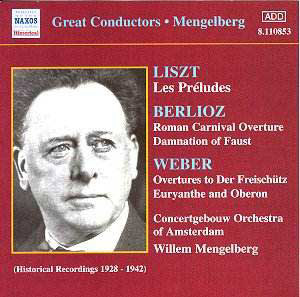A well-chosen selection of concert overtures is the
spine of this latest installment on Naxos’ Great Conductors series.
The recordings cover the years 1928-42, though this means, specifically,
one Columbia session in 1928, another in 1929, and a final one in 1931
followed by the two Telefunkens of 1937 and 1942 (in both cases of Berlioz).
As ever with Mengelberg there is drama and theatricality in profusion,
colour and intense rubati, uniform portamenti and a highly individual
and personalized approach to form – all of which, needless to say, is
fascinating if not always, to the purist, convincing.
Der Freischütz has an elastic sense of narrative,
plentiful rubati and rich lower strings at 7.25 whilst in Euryanthe
Mengelberg conjures overlapping string lines and indulges little agogics,
intensely theatrical and dramatic. He demonstrates a real sense of paragraphal
conducting, encouraging a lighter weight of string tone and conjuring
up evocative pictorialism – basses of real amplitude and puncturing
brass. Naturally this approach involves departures from pulse and line
but it is intensely fresh and exciting. Oberon opens with an evocative
somnambulant air but there is a thrilling immediacy to his subsequent
fortissimi, well captured in the Concertgebouw in 1928, which defies
objection. His Scherzo from Mendelssohn’s A Midsummer Night’s Dream
is superfine and astoundingly fast; it makes Toscanini’s contemporary
recording sound positively lumpy. You’ll love it or loathe it. In the
Carnival Romain Mengelberg achieves elegance rather than forceful
declamation; with strong rubati and mellow strings he is more pliant
than de Sabata and less conclusive than Beecham – a subtle reading,
not at all swashbuckling and self-aggrandizing though not without power
and excitement either.
For the excerpts from The Damnation of Faust he conjures
up a magnificently spectral atmosphere for the Will-o’-the-Wisps whilst
The Dance of the Sylphs are accompanied by a true galaxy of string slides
– most instructive to hear Mengelberg’s unashamed expressivity intact
in 1942 and in the Hungarian March his accelerandos are fearsome and
powerfully exact. Which leaves his incandescent Les Préludes
of 1929. The trumpet rings out thrillingly, cellos and violas play with
pliancy, the burning basses coruscate, the syntax of the work is certainly
stretched taut by Mengelberg but triumphantly so. This defiant and magnificent
1929 recording sounds ringingly triumphant in Naxos’s restoration; in
fact the whole disc does. Ian Julier’s notes strike his usual intelligent
balance between fact and judgement. Exciting, revivifying stuff.
Jonathan Woolf


